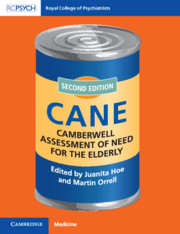Book contents
- Camberwell Assessment of Need for the Elderly
- Camberwell Assessment of Need for the Elderly (CANE)
- Copyright page
- Contents
- Figures
- Tables
- Contributors
- Acknowledgements
- Chapter 1 An Introduction to Needs Assessment and Use of the Camberwell Assessment of Need for the Elderly
- Chapter 2 Self-Reported Needs of People with Dementia Living at Home
- Chapter 3 Needs of Older Primary Care Patients
- Chapter 4 Unmet Needs of Older Persons with and Without Depression in Residential Homes
- Chapter 5 Needs of Older People Living Alone
- Chapter 6 Needs Assessment of People with Dementia and Impact of Caregiver Burden
- Chapter 7 Crisis and Assessment of Need in Dementia
- Chapter 8 Needs of People with Young-Onset Dementia
- Chapter 9 Needs of Older People in Long-Term Care Settings
- Chapter 10 Needs and Healthcare Costs in Old Age
- Chapter 11 The Future of Needs Assessment Research
- Instructions for the CANE
- Index
- References
Chapter 8 - Needs of People with Young-Onset Dementia
Published online by Cambridge University Press: 10 June 2021
- Camberwell Assessment of Need for the Elderly
- Camberwell Assessment of Need for the Elderly (CANE)
- Copyright page
- Contents
- Figures
- Tables
- Contributors
- Acknowledgements
- Chapter 1 An Introduction to Needs Assessment and Use of the Camberwell Assessment of Need for the Elderly
- Chapter 2 Self-Reported Needs of People with Dementia Living at Home
- Chapter 3 Needs of Older Primary Care Patients
- Chapter 4 Unmet Needs of Older Persons with and Without Depression in Residential Homes
- Chapter 5 Needs of Older People Living Alone
- Chapter 6 Needs Assessment of People with Dementia and Impact of Caregiver Burden
- Chapter 7 Crisis and Assessment of Need in Dementia
- Chapter 8 Needs of People with Young-Onset Dementia
- Chapter 9 Needs of Older People in Long-Term Care Settings
- Chapter 10 Needs and Healthcare Costs in Old Age
- Chapter 11 The Future of Needs Assessment Research
- Instructions for the CANE
- Index
- References
Summary
In the past decade, there has been a growing interest among policymakers, researchers and clinicians in individuals living with dementia at a young age. However, no consensus currently exists about what age should actually be considered young.1 In recent literature addressing the specific issues that younger people living with dementia encounter, often the age of 65 is used as the cut-off age to distinguish younger individuals from those living with dementia at an older age.
- Type
- Chapter
- Information
- Camberwell Assessment of Need for the ElderlyCANE, pp. 77 - 85Publisher: Cambridge University PressPrint publication year: 2021

